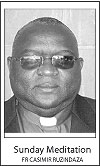This Sunday Christians all over the world are celebrating the Solemnity of the Most Holy Trinity. The liturgy of this feast day is based on the following readings: Readings: Exodus 34:4-6, 8-9; Psalm: Daniel 3:52-55; 2 Corinthians 13:11-13; John 3:16-18.The main theme of this liturgy is on the major revelation of the Triune God in human history.


This Sunday Christians all over the world are celebrating the Solemnity of the Most Holy Trinity. The liturgy of this feast day is based on the following readings: Readings: Exodus 34:4-6, 8-9; Psalm: Daniel 3:52-55; 2 Corinthians 13:11-13; John 3:16-18.
The main theme of this liturgy is on the major revelation of the Triune God in human history.
The readings show us God’s intervention in saving humankind from sin in the person of Jesus Christ. And the central message is that the self-sacrifice of the Son of God is source of eternal life for all those who believe in the Son of God.
In the second reading, St. Paul advises the Christians at Corinth to live guided by the Holy Spirit.
And this should be demonstrated by their love of peace and unity of the children of God. And that is how God’s love can be reflected in their life.
From a doctrinal point of view, the best understanding of the Trinity of Persons in God in our human understanding can be grasped in the triple way we perceive God in creation, salvation and sanctification.
While all divine work is common to the three divine persons, their different work is manifested differently. The creation expresses the Fatherhood of God as the origin and end of all reality.
God became man and through self-sacrifice revealed the love of God for men as well as expressing the Sonship of God, who brings all things back to the Father.
And God’s work is brought to its culmination through the Spirit of God revealed as a fire within the baptized that moves the heart to freely cooperate in God’s saving work as he sanctifies them.
From a pastoral point of view, we plunge into difficulties when we try to express the Trinity of Persons in a conceptually logical way.
While it is theologically necessary to be precise when choosing terms, its theoretical expression is not our purpose here.
We need to remember that we are dealing with realities that can be experienced even if not fully understood.
That is why we can come to appreciate the realities of Trinitarian life without necessarily trying to tie them together in concepts.
The Fatherhood of God in creation: we tend to interpret the word "creature” in its limited, negative sense: something worse than a slave.
This is to distort its beauty as a reflection of the Father Creator. Love is to affirm another’s existence; creation is the comparative form of affirmation, to affirm something by bringing it into existence.
The Son as Savior: Human, can seem today arbitrary and unfathomable. Why are so many people in the world denied opportunities?
Why does someone else succeed in my place? We are tempted in two ways: to think we have the answer to life, or to abandon any attempt to understand and give meaning to life’s events.
We seem "thrown out onto the universe” (M. Heidegger). Christianity uses some deceptively simple images to suggest that there is a divine reality at work bringing everything to fulfillment.
The parables and metaphors of lost sheep and lost sons reveal a reality of a God who saves.
The human image of a crucified man portrays (and accomplishes) the degree of the saving love of God. We find it hard to grasp.
The Spirit that sanctifies: The Acts of the Apostles refers to the experience of God’s Spirit coming to the apostles in terms of fire and thunder.
There are people who have experienced this reality and have shown in their lives the reality of God’s love within them.
While never dispossessing them of their free decisions, the Spirit enlightens and prompts the human mind and will to achieve salvation, eternal life.
Today we find ourselves so much at the prey of the marketing-minded that it is hard to be and to think for oneself.
If we could, we would soon recognize a more genuine voice than what we are subject to, a voice that is a genuine inner experience of God’s Spirit that sanctifies.
Ends


